中国餐桌礼仪-双语
- 格式:doc
- 大小:34.00 KB
- 文档页数:2
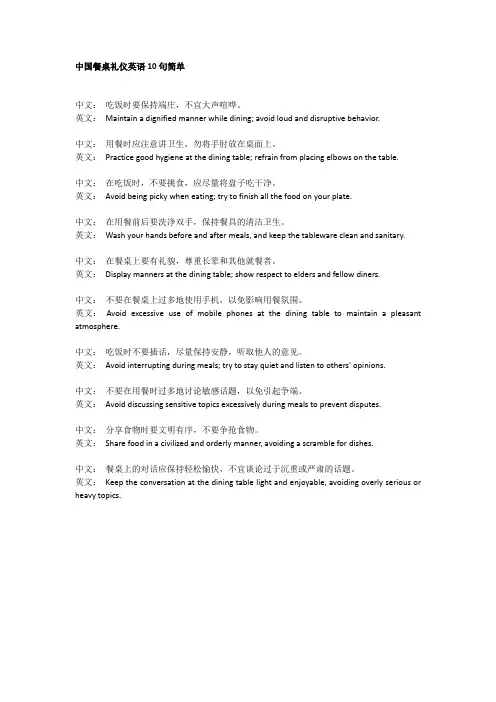
中国餐桌礼仪英语10句简单中文:吃饭时要保持端庄,不宜大声喧哗。
英文:Maintain a dignified manner while dining; avoid loud and disruptive behavior.中文:用餐时应注意讲卫生,勿将手肘放在桌面上。
英文:Practice good hygiene at the dining table; refrain from placing elbows on the table.中文:在吃饭时,不要挑食,应尽量将盘子吃干净。
英文:Avoid being picky when eating; try to finish all the food on your plate.中文:在用餐前后要洗净双手,保持餐具的清洁卫生。
英文:Wash your hands before and after meals, and keep the tableware clean and sanitary.中文:在餐桌上要有礼貌,尊重长辈和其他就餐者。
英文:Display manners at the dining table; show respect to elders and fellow diners.中文:不要在餐桌上过多地使用手机,以免影响用餐氛围。
英文:Avoid excessive use of mobile phones at the dining table to maintain a pleasant atmosphere.中文:吃饭时不要插话,尽量保持安静,听取他人的意见。
英文:Avoid interrupting during meals; try to stay quiet and listen to others' opinions.中文:不要在用餐时过多地讨论敏感话题,以免引起争端。
英文:Avoid discussing sensitive topics excessively during meals to prevent disputes.中文:分享食物时要文明有序,不要争抢食物。
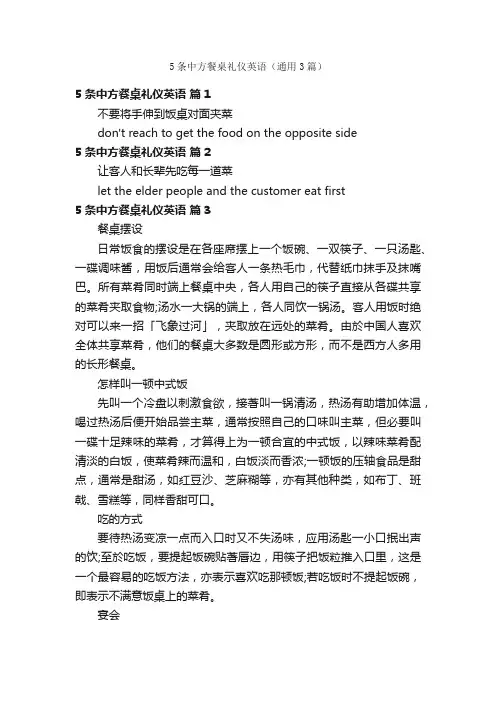
5条中方餐桌礼仪英语(通用3篇)5条中方餐桌礼仪英语篇1不要将手伸到饭桌对面夹菜don't reach to get the food on the opposite side5条中方餐桌礼仪英语篇2让客人和长辈先吃每一道菜let the elder people and the customer eat first5条中方餐桌礼仪英语篇3餐桌摆设日常饭食的摆设是在各座席摆上一个饭碗、一双筷子、一只汤匙、一碟调味酱,用饭后通常会给客人一条热毛巾,代替纸巾抹手及抹嘴巴。
所有菜肴同时端上餐桌中央,各人用自己的筷子直接从各碟共享的菜肴夹取食物;汤水一大锅的端上,各人同饮一锅汤。
客人用饭时绝对可以来一招「飞象过河」,夹取放在远处的菜肴。
由於中国人喜欢全体共享菜肴,他们的餐桌大多数是圆形或方形,而不是西方人多用的长形餐桌。
怎样叫一顿中式饭先叫一个冷盘以刺激食欲,接著叫一锅清汤,热汤有助增加体温,喝过热汤后便开始品尝主菜,通常按照自己的口味叫主菜,但必要叫一碟十足辣味的菜肴,才算得上为一顿合宜的中式饭,以辣味菜肴配清淡的白饭,使菜肴辣而温和,白饭淡而香浓;一顿饭的压轴食品是甜点,通常是甜汤,如红豆沙、芝麻糊等,亦有其他种类,如布丁、班戟、雪糕等,同样香甜可口。
吃的方式要待热汤变凉一点而入口时又不失汤味,应用汤匙一小口抿出声的饮;至於吃饭,要提起饭碗贴著唇边,用筷子把饭粒推入口里,这是一个最容易的吃饭方法,亦表示喜欢吃那顿饭;若吃饭时不提起饭碗,即表示不满意饭桌上的菜肴。
宴会中国人很少在日常用饭时喝酒,但酒在他们的盛宴上则担当重要的角色。
在宴会开始时,主人家必先向客人祝酒,这时客人的饮酒兴致便油然而生,啤酒或汽水都可用来祝酒,要先为别人添酒或汽水,后为自己添加,才合乎礼仪,且要添至近乎满泻为止,以表示尊重对方及彼此友谊,而主人家要尽情灌醉客人,才算合乎礼仪。
若你不想饮酒,应在宴会开始时便表明,以免出现尴尬的场面。
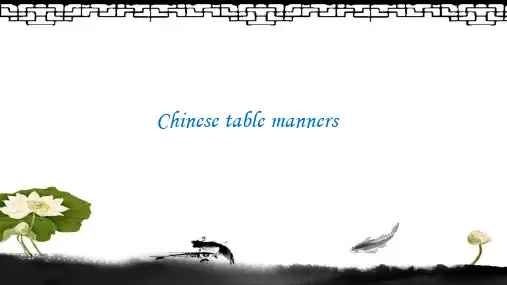
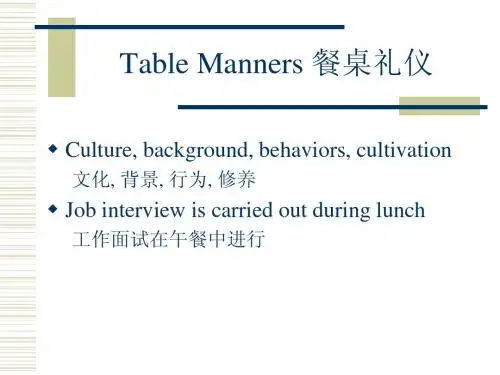
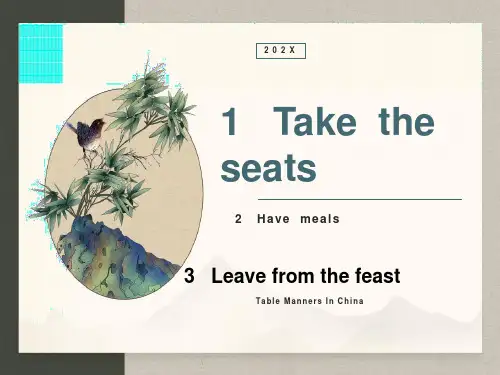
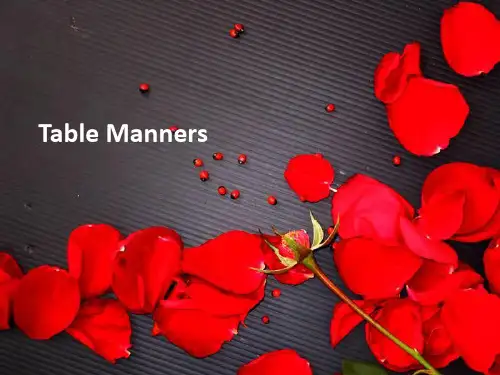
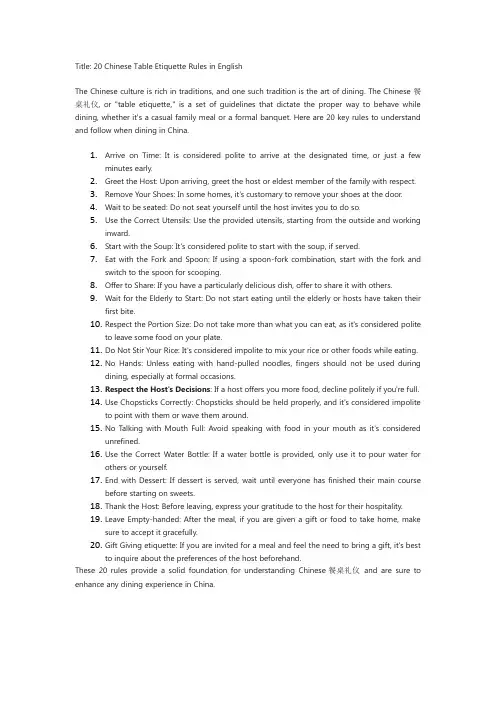
Title: 20 Chinese Table Etiquette Rules in EnglishThe Chinese culture is rich in traditions, and one such tradition is the art of dining. The Chinese餐桌礼仪, or "table etiquette," is a set of guidelines that dictate the proper way to behave while dining, whether it's a casual family meal or a formal banquet. Here are 20 key rules to understand and follow when dining in China.1.Arrive on Time: It is considered polite to arrive at the designated time, or just a fewminutes early.2.Greet the Host: Upon arriving, greet the host or eldest member of the family with respect.3.Remove Your Shoes: In some homes, it's customary to remove your shoes at the door.4.Wait to be seated: Do not seat yourself until the host invites you to do so.e the Correct Utensils: Use the provided utensils, starting from the outside and workinginward.6.Start with the Soup: It's considered polite to start with the soup, if served.7.Eat with the Fork and Spoon: If using a spoon-fork combination, start with the fork andswitch to the spoon for scooping.8.Offer to Share: If you have a particularly delicious dish, offer to share it with others.9.Wait for the Elderly to Start: Do not start eating until the elderly or hosts have taken theirfirst bite.10.Respect the Portion Size: Do not take more than what you can eat, as it's considered politeto leave some food on your plate.11.Do Not Stir Your Rice: It's considered impolite to mix your rice or other foods while eating.12.No Hands: Unless eating with hand-pulled noodles, fingers should not be used duringdining, especially at formal occasions.13.Respect the Host's Decisions: If a host offers you more food, decline politely if you're full.e Chopsticks Correctly: Chopsticks should be held properly, and it's considered impoliteto point with them or wave them around.15.No Talking with Mouth Full: Avoid speaking with food in your mouth as it's consideredunrefined.e the Correct Water Bottle: If a water bottle is provided, only use it to pour water forothers or yourself.17.End with Dessert: If dessert is served, wait until everyone has finished their main coursebefore starting on sweets.18.Thank the Host: Before leaving, express your gratitude to the host for their hospitality.19.Leave Empty-handed: After the meal, if you are given a gift or food to take home, makesure to accept it gracefully.20.Gift Giving etiquette: If you are invited for a meal and feel the need to bring a gift, it's bestto inquire about the preferences of the host beforehand.These 20 rules provide a solid foundation for understanding Chinese餐桌礼仪and are sure to enhance any dining experience in China.。
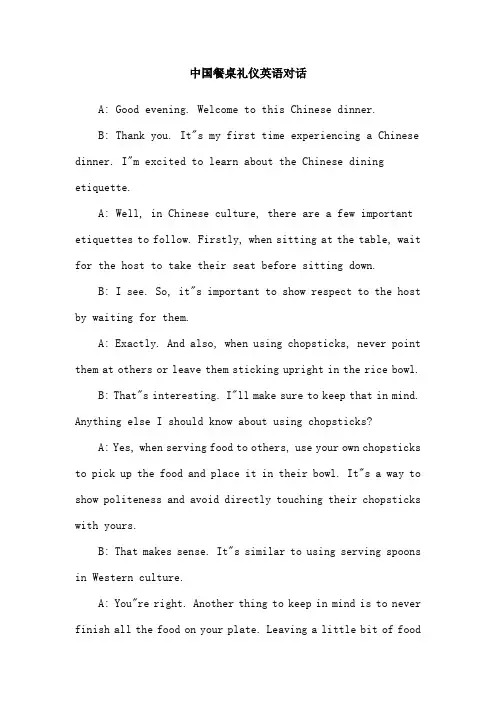
中国餐桌礼仪英语对话A: Good evening. Welcome to this Chinese dinner.B: Thank you. It"s my first time experiencing a Chinese dinner. I"m excited to learn about the Chinese dining etiquette.A: Well, in Chinese culture, there are a few important etiquettes to follow. Firstly, when sitting at the table, wait for the host to take their seat before sitting down.B: I see. So, it"s important to show respect to the host by waiting for them.A: Exactly. And also, when using chopsticks, never point them at others or leave them sticking upright in the rice bowl. B: That"s interesting. I"ll make sure to keep that in mind. Anything else I should know about using chopsticks?A: Yes, when serving food to others, use your own chopsticks to pick up the food and place it in their bowl. It"s a way to show politeness and avoid directly touching their chopsticks with yours.B: That makes sense. It"s similar to using serving spoons in Western culture.A: You"re right. Another thing to keep in mind is to never finish all the food on your plate. Leaving a little bit of foodshows that you"ve been well-fed and satisfied.B: I didn"t know that. I"ll remember not to eat everything on my plate.A: Lastly, it is customary to say "ganbei" (bottoms up) to show respect and appreciation when toasting with others. It"s considered impolite to refuse a toast.B: I"ll remember that. Thanks for sharing these dining etiquettes with me. I"m looking forward to enjoying this Chinese dinner while following these customs.A: You"re welcome. Enjoy your meal!。

餐桌上的礼仪(中英文对照)1、In china, it is a tradition for our Chinese people to eat with chopsticks. Each of persons in the dinner table would have a pair of chopsticks, and there is also an extra one that is for public use.2、When people are eating, it is very impolite to eat with a loud sound. And to speak while food is still in the mouth is not allowed in China as well.3、Another thing should remember when a forEigner visits Chinese families is that they should let the older ones in the family to eat first, if the elder ones do not start, everyone else should not start either.4、Do not eat only one dish even if that is your favorite one, you should eat other dishes too. To eat merely one dish all the times is another bad habit in Chinese eyes.5、When Chinese people say: “ I put a little bit more sugar in this fish,I hope you do not mind” generally speaking, it is a typical saying which can indicate one of our Chinese characters-----humble. Thus, you must not take it serious and must not say:“yeah, so it is, but I do not mind.” You should say “does it? I do not think so, it is the best flavor that I have never tasted before.”1推荐第一,入座的礼仪。
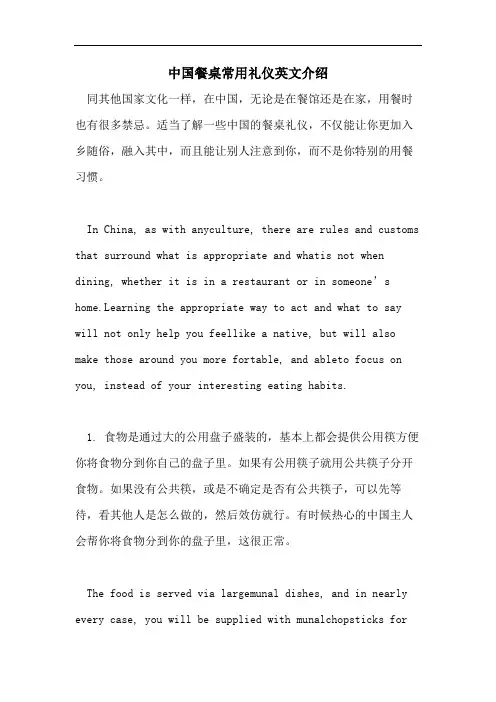
中国餐桌常用礼仪英文介绍同其他国家文化一样,在中国,无论是在餐馆还是在家,用餐时也有很多禁忌。
适当了解一些中国的餐桌礼仪,不仅能让你更加入乡随俗,融入其中,而且能让别人注意到你,而不是你特别的用餐习惯。
In China, as with anyculture, there are rules and customs that surround what is appropriate and whatis not when dining, whether it is in a restaurant or in someone’s home.Learning the appropriate way to act and what to say will not only help you feellike a native, but will also make those around you more fortable, and ableto focus on you, instead of your interesting eating habits.1. 食物是通过大的公用盘子盛装的,基本上都会提供公用筷方便你将食物分到你自己的盘子里。
如果有公用筷子就用公共筷子分开食物。
如果没有公共筷,或是不确定是否有公共筷子,可以先等待,看其他人是怎么做的,然后效仿就行。
有时候热心的中国主人会帮你将食物分到你的盘子里,这很正常。
The food is served via largemunal dishes, and in nearly every case, you will be supplied with munalchopsticks fortransferring food from the main dishes to your own. You shoulduse the munal chopsticks if they are supplied. If they are not or you areunsure, wait for someone to serve food to their own plate, and then copy whatthey do. On oasion, an eager Chinese host may place food into your bowl or onyour plate. This is normal.2. 分到你盘子的食物你不吃是很失礼的。
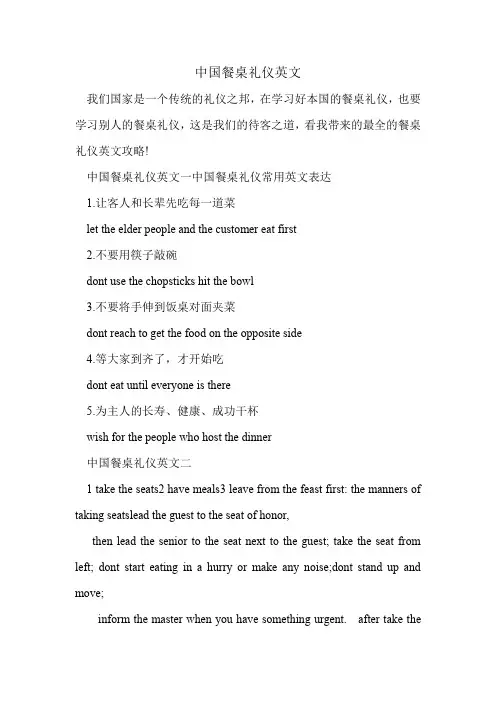
中国餐桌礼仪英文我们国家是一个传统的礼仪之邦,在学习好本国的餐桌礼仪,也要学习别人的餐桌礼仪,这是我们的待客之道,看我带来的最全的餐桌礼仪英文攻略!中国餐桌礼仪英文一中国餐桌礼仪常用英文表达1.让客人和长辈先吃每一道菜let the elder people and the customer eat first2.不要用筷子敲碗dont use the chopsticks hit the bowl3.不要将手伸到饭桌对面夹菜dont reach to get the food on the opposite side4.等大家到齐了,才开始吃dont eat until everyone is there5.为主人的长寿、健康、成功干杯wish for the people who host the dinner中国餐桌礼仪英文二1 take the seats2 have meals3 leave from the feast first: the manners of taking seatslead the guest to the seat of honor,then lead the senior to the seat next to the guest; take the seat from left; dont start eating in a hurry or make any noise;dont stand up and move;inform the master when you have something urgent. after take theseat, keep a proper posture; keep your feet under your seat, dont straighten or step under othersseats; dont keep your elbows?肘部?to the edge of the table or put your hands on another chairs back . second :manners at mealtimesask the visitor and the elderto move the chopsticks first.the hosts should help the guests to the food or ask them to help themselves.eat with little noise and movement. do not make a hiccup (打嗝?or a soundlike a hiccup.you may not slurp(出声地吃喝?your soup.dont eat until everyone is there. dont reach to get the food on the opposite side. help people to dish with servingchopsticks, centiliter(公勺?, and never help people to dish with chopsticks or your used ladle?长柄勺?.dont spit the fishbone or litter it everywhere, you should takeit out with your hands, then put it on the napkin or your empty plate. timely talking can enliven the atmosphere of the mealtimes. so do not think of nobody but yourself.and may not bolt down(狼吞虎咽?your food.had better not pick your teeth with a toothpick. if you must do it, you should screen your mouth with napkin or your hands.definitude the primary mission of the meal. if it is a business meal, let the main negotiators seat together to communicate with each other.however if it is only to make friendlycontacts, what you need to do is just to pay attention to some commonsocial courtesies and lay a lot of stress on dish appreciation. third: leave the feastmaster; or invite the masterto your house hereafter . thanks for your entertainment!when leave the feast, you should show your thank to the mastervisitor thanks for your attention ?中国餐桌礼仪英文三1. admission etiquette. ask guests seated on the seats. pleaseelderly guests in attendance were seated next to attendance at from the left side into the chair. admission dongkuaizi not after. what more do not come to beep. not to get up walk. if what happened to the owner notice.second, when the meal. ask guests. long the dongkuaizi. jiacai,each less. far from the food on their own eat some. meal not a voice. heshang also not a sound use kaitang i spoon a small drink and a small mouth. pawan front-lips not drink, soup,hot cool after zaikai. side not to drink while blowing some people prefer to chew food to eat. extraordinary feel like work is crisp chewing food, a very clear voices. this is not etiquette demands.extraordinary and everyone is eating together, as far as possible to prevent the emergence of this phenomenon.third: do not eat hiccup, other voices will not arise if there sneezing, changming involuntarily, such as the sound, it is necessary to say i am sorry.; i am sorry;. of the original cooler. within the words . to show regret.fourth if guests or elders give cloth dish. best use of chopsticks may also be the guests or elders far away from the dishes to their front, according to the habit of the chinese nation.dish is a one of the top. if the same tables leadership, the elderly, the guests said. whenever of a new dish, let them first dongkuaizi. rotation or invite them to the first dongkuaizi. to show their importance.fifth: eat the head, fishbone, bones and other objects, not wangwaimian vomit, not onto the ground still. slowly to get their hands diezili, or close on their own or on canzhuobian prepared beforehand good on paper. sixth: to a timely manner about the time and people just a few humorous, to reconcile the atmosphere. guangzhaotou not eat, regardless of others, and do not devour and destroy the lavish meal, not jail sentence.7: it is best not to the dinner table tiya if it is to tiya, will use napkins or sign blocked their mouths.8: to clear the main tasks of the meal. must be clear to do business oriented. feelings or to the main contact. mainly or to eat. if it is the former, when attention should bepaid to the seating arrangements. their main negotiators theseats near each other to facilitate conversations, or dredge emotion. if it is the after. need only pay attention to common-sense courtesy on the line, to focus on the appreciation of dishes,9: the last time left. must be expressed gratitude to the host. at the invitation of the owner or to their own homes after the house to show backchina is the etiquette of helping people, minsishiweitian, dining how can no rules! while stressing that no attention is three meals a day, but do not know know better than ok!1. inviting guests to notice, ruxi 6:00, 5:50才叫your elderly guests, it does not.2. hosts who looked to be late; guests should be 5-10 minutes late, and this is very considerateguests oh, and pay attention to grasp, natural host and the guest are huan. 3. if sit round a table, facing the door of the main blocks, or back * walls, counters; emphasize some hotelswill be used napkins distinction, the highest position napkins can not casually sit oh, unless you intend to good banquet woven?: d4. masters of the subject and object of the right hand side,the left hand side of the important guests; * gate facing the master, of course, is run errands entertain the peiqia sit you. 5. guests do not directly to the members of a la carteand calling guidance, obediently waiting for the hosts who looked to be a la carte if guests really serious taboos or hobbies, and should be gently told the hosts who looked, theowner of natural putting his interests and meet guests little or significantly requirements. 6. hosts who looked not need points or less grasping points, or holding food dishes,such as crab, lobster legs, ribs, and so on. for a meal to the three dishes such a rule no. what can be said etiquette! 7. not a small amount of force will not object to others drink wine without fragmentation feast! 8. on the wine servings! foreigner likes to boast of skill, people may boast their own point-for the food, hosts who looked at carefully observed liangcai qi, every cup have drinks later, when immediately drank to welcome the start. . . like, rotating disk or right hand side indicate the subject and object moving first chopsticks. tuirang subject and object shouldnot be too long, oh, we stomachs are hungry, it will eat you open! do not forget to eat the praise of some oh. 9. after one of every dish, although the waiter and owner will stillgo before the subject and object, but not too rigidly stick with you, if just in front of me, dead people rotating disc, i would first folder a small taste of chopsticks ! 10.hosts who looked often to the disk will cater to the vast majority ofguests; peiqia then added services to entertain; guests can not touch the hands of disk integrity and eatmeals, the two sides are also huan you. 11. if there is no attendant at the food or chopsticks, gongbiao, jiacai the first time can be good, must not use their own chopsticksto pick in the session to pick, and even stirring! not everyone is like love, like you do not mind the saliva chopsticks! usually identified from their recent selection part. 12. let chopsticks on the best food in their transition to a dish in only into the mouth. phase seem to be eating is not so urgent. 13. when chewing food in themouth, remember bijin lips is a major event, so to speak, falling objects, shishui spills, as well as to avoid a puma puma ji ji annoyance beep. 14. during the meal, or both before and after the meal, should be back straight, as far as possible but not later * chairs sit. during the meal , basically in the hands above the desktop. 15. the master of a very good appetite, and weight loss are guests, not the fanju oh.中国餐桌上的礼仪归结为以下几点:一.入座的礼仪.先请客人入座上席.在请长者入座客人旁依次入座,入座时要从椅子左边进入.入座后不要动筷子.更不要弄出什么响声来.也不要起身走动.假如有什么事要向主人打招呼.第二,进餐时.先请客人.长着动筷子.夹菜时每次少一些.离自己远的菜就少吃一些.吃饭时不要出声音.喝汤时也不要出声响,喝汤用汤匙一小口一小口地喝.不宜把碗端到嘴边喝,汤太热时凉了以后再喝.不要一边吹一边喝.有的人吃饭喜欢用咀嚼食物.非凡是使劲咀嚼脆食物,发出很清楚的声音来.这种做法是不合礼仪要求的.非凡是和众人一起进餐时,就要尽量防止出现这种现象.。
5条中方餐桌礼仪英语(3篇)5条中方餐桌礼仪英语(精选3篇)5条中方餐桌礼仪英语篇1不要将手伸到饭桌对面夹菜dont reach to get the food on the opposite side5条中方餐桌礼仪英语篇2让客人和长辈先吃每一道菜let the elder people and the customer eat first5条中方餐桌礼仪英语篇3一、座次总的来讲,座次是“尚左尊东”、“面朝大门为尊”。
若是圆桌,则正对大门的为主客,主客左右手边的位置,则以离主客的距离来看,越靠近主客位置越尊,相同距离则左侧尊于右侧。
若为八仙桌,如果有正对大门的座位,则正对大门一侧的右位为主客。
如果不正对大门,则面东的一侧右席为首席。
如果为大宴,桌与桌间的排列讲究首席居前居中,左边依次2、4、6席,右边为3、5、7席,根据主客身份、地位,亲疏分坐。
如果你是主人,你应该提前到达,然后在靠门位置等待,并为来宾引座。
如果你是被邀请者,那么就应听从东道主安排入座。
一般来说,如果你的老板出席的话,你应该将老板引至主座,请客户最高级别的坐在主座左侧位置。
除非这次招待对象的领导级别非常高。
二、点菜如果时间允许,你应该等大多数客人到齐之后,将菜单供客人传阅,并请他们来点菜。
当然,作为公务宴请,你会担心预算的问题,因此,要控制预算,你最重要的是要多做饭前功课,选择合适档次的请客地点是比较重要的,这样客人也能大大领会你的预算。
况且一般来说,如果是你来买单,客人也不太好意思点菜,都会让你来作主。
如果你的老板也在酒席上,千万不要因为尊重他,或是认为他应酬经验丰富,酒席吃得多,而让他/她来点菜,除非是他/她主动要求。
否则,他会觉得不够体面。
如果你是赴宴者,你应该知道,你不该在点菜时太过主动,而是要让主人来点菜。
如果对方盛情要求,你可以点一个不太贵、又不是大家忌口的菜。
记得征询一下桌上人的意见,特别是问一下“有没有哪些是不吃的?”或是“比较喜欢吃什么?”让大家感觉被照顾到了。
餐桌上的礼仪用英语介绍当有一天,你有外国的朋友来,这个时候你就要为外国友人介绍餐桌上的一切,那么你们知道要怎么办吗?下面是小编为大家整理的餐桌上的礼仪英语,希望能够帮到大家哦!餐桌上的礼仪英语中国饮食在世界上是很有名的。
Ibelieve the Chinese food is famous around the world.假如你来到中国,中国朋友请你吃饭,你就需要了解一下有关宴会中的座次问题。
Andif you are in China and you are asked by your Chinese friend to a dinner, youmay want to know how to pick up your seat at the table and what is the properway to sit at the table.这个位子一般是主位,是主人的。
Well,normally this seat is the seat for the host or the hostess.这个位子面朝着门。
(面朝着门的一般是主位。
)Theseat is facing the door of this room.也可以根据餐巾的样式来辨别座位。
Onemay also distinguish the seats at the table from the style in which the napkinsare folded.无论餐巾折成什么样式,最高的餐巾对应的座位,一定是主位。
Regardlessof how the napkins are arranged.,thetallest arrangement will always correspond to the master seat.一张坐四五个人的小桌子,与主人的座位相对应的背对着门的那个位置则是被邀请的主客坐的位置。
Atthe small table, a table for four of five, the seat right across of the hostseat, the seat over there, the back of which is facing the door is the seat forthe main guest.当然如果桌子大一点的时候,比如说可以坐十到十二个人的桌子,由于主人和客人说话不太方便,跨越桌子就像跨越一片大海一样,所以他们可以挨着坐,这种情况下是可以挨着坐的,这样坐主人和客人说话更方便一些。
中国的餐桌礼仪英语1.让客人和长辈先吃每一道菜let the elder people and the customer eat first 2.不要用筷子敲碗don't use the chopsticks hit the bowl3.不要将手伸到饭桌对面夹菜don't reach to get the food on the opposite side 4.等大家到齐了,才开始吃don't eat until everyone is there5.为主人的长寿、健康、成功干杯wish for the people who host the dinnerThe main difference between Chinese and western eating habits is that unlike the West, where everyone has their own plate of food, in China the dishes are placed on the table and everybody shares. If you are being treated by a Chinese host, be prepared for a ton of food. Chinese are very proud of their culture of cuisine and will do their best to show their hospitality.And sometimes the Chinese host use their chopsticks to put food in your bowl or plate. This is a sign of politeness. The appropriate thing to do would be to eat the whatever-it-is and say how yummy it is. If you feel unfortable with this, you can just say a polite thank you and leave the food there.Eating No-no'sDon't stick your chopsticks upright in the ricebowl.Instead,lay them on your dish. The reason for this is that when somebody dies,the shrine to them contains a bowl of sand or rice with two sticks of incense stuck upright in it. So if you stick your chopsticks in the rice bowl, itlooks like this shrine and is equivalent to wishing death upon a person at the table!Make sure the spout of the teapot is not facing anyone.It is impolite to set the teapot down where the spout is facing towards somebody. The spout should always be directed to where nobody is sitting, usually just outward from the table.Don't tap on your bowl with your chopsticks.Beggars tap on their bowls, so this is not polite.Also, when the foodis ing too slow in a restarant, people will tap their bowls. If you are in someone's home,it is like insulting the cook.DrinkingGan Bei! (Cheers! “Gan Bei” literally means “dry [the] glass”) Besides beer, the official Chinese alcoholic beverage is Bai Jiu,high-proof Chinese liquor made from assorted grains. There are varying degrees of Bai Jiu. TheBei ___g favorite is called Er Guo Tou, which is a whopping 56% alcohol. More expensive are Maotai and Wuliangye.模板,内容仅供参考。
英语介绍中国餐桌礼仪比如现在你要给一个国外来的有人介绍我们的中国的餐桌礼仪,那么你知道我们要注意什么吗?下面是小编为大家整理的英语介绍中国餐桌礼仪,希望能够帮到大家哦!英语介绍中国餐桌礼仪中国饮食在世界上是很有名的。
Ibelieve the Chinese food is famous around the world.假如你来到中国,中国朋友请你吃饭,你就需要了解一下有关宴会中的座次问题。
Andif you are in China and you are asked by your Chinese friend to a dinner, youmay want to know how to pick up your seat at the table and what is the properway to sit at the table.这个位子一般是主位,是主人的。
Well,normally this seat is the seat for the host or the hostess.这个位子面朝着门。
(面朝着门的一般是主位。
)Theseat is facing the door of this room.也可以根据餐巾的样式来辨别座位。
Onemay also distinguish the seats at the table from the style in which the napkinsare folded.无论餐巾折成什么样式,最高的餐巾对应的座位,一定是主位。
Regardlessof how the napkins are arranged.,thetallest arrangement will always correspond to the master seat.一张坐四五个人的小桌子,与主人的座位相对应的背对着门的那个位置则是被邀请的主客坐的位置。
Atthe small table, a table for four of five, the seat right across of the hostseat, the seat over there, the back of which is facing the door is the seat forthe main guest.当然如果桌子大一点的时候,比如说可以坐十到十二个人的桌子,由于主人和客人说话不太方便,跨越桌子就像跨越一片大海一样,所以他们可以挨着坐,这种情况下是可以挨着坐的,这样坐主人和客人说话更方便一些。
Dining rules and customs in China 中国餐桌礼仪
In China, as with any culture, there are rules and customs that surround what is appropriate and what is not when dining, whether it is in a restaurant or in someone’s home. Learning the appropriate way to act and what to say will not only help you feel like a native, but will also make those around you more comfortable, and able to focus on you, instead of your interesting eating habits.
同其他国家文化一样,在中国,无论是在餐馆还是在家,用餐时也有很多禁忌。
适当了解一些中国的餐桌礼仪,不仅能让你更加入乡随俗,融入其中,而且能让别人注意到你,而不是你特别的用餐习惯。
1. The food is served via large communal dishes, and in nearly every case, you will be supplied with communal chopsticks for transferring food from the main dishes to your own. You should use the communal chopsticks if they are supplied. If they are not or you are unsure, wait for someone to serve food to their own plate, and then copy what they do. On occasion, an eager Chinese host may place food into your bowl or on your plate. This is normal.
1. 食物是通过大的公用盘子盛装的,基本上都会提供公用筷方便你将食物分到你自己的盘子里。
如果有公用筷子就用公共筷子分开食物。
如果没有公共筷,或是不确定是否有公共筷子,可以先等待,看其他人是怎么做的,然后效仿就行。
有时候热心的中国主人会帮你将食物分到你的盘子里,这很正常。
2. It is rude to not eat what you are given. If you are offered something you absolutely can't stomach, finish everything else, and leave the rest on your plate. Leaving a little food generally indicates that you are full.
2. 分到你盘子的食物你不吃是很失礼的。
如果有些食物你真的吃不下可以先把其他能吃的吃掉,然后把不想吃的剩在盘子里就行。
通常盘子里剩下一点儿食物说明你已经吃饱了。
3. Don't stab your chopsticks into your bowl of rice. As with any Buddhist culture, placing two chopsticks down in a bowl of rice is what happens at a funeral.
3. 不要把筷子插在装满米饭的碗里。
因为在佛教文化里,将双筷插在碗里是葬礼时的祭祀仪式。
4. Do not play with your chopsticks, point at objects with them, or drum them on the table - this is rude. Do not tap them on the side of your dish, either, as this is used in restaurants to indicate that the food is taking too long, and it will offend your host.
4. 不要把玩筷子,比如用筷子指手画脚,或是在桌上敲击筷子,这些都是很失礼的,也切勿用筷子敲击你的盘子,这在餐馆里是暗示上菜太慢,很有可能会触怒待客的主人。
5. When setting down your chopsticks, place them horizontally on top of your plate, or place the ends on a chopstick rest. Do not set them on the table.
5. 当你想放下筷子时,要将筷子水平放置在你的盘子上,或者将筷子搁置在筷子架上,别将筷子放置在桌子上。
6. Hold the chopsticks in your right hand between the thumb and index finger, and when eating rice, place the small bowl in your left hand, holding it off the table.
6. 应该右手持筷,用大拇指和食指夹紧筷子。
吃饭时,左手托碗,使碗离开桌面。
7. Do not stab anything with your chopsticks, unless you are cutting vegetables or similar. If you are in a small, intimate setting with friends, then stabbing smaller so as to grab items is okay, but never do this at a formal dinner or around those who adhere strictly to tradition.
7. 不要用筷子戳东西,除非是将大片蔬菜或其他食物分开。
如果是跟亲密朋友的小型聚餐,将食物用筷子分成小块方便夹取是可以的,但在正式宴会上,或是同桌人都非常遵守传统的场合千万别这么做。
8. When tapping glasses for a cheer, be sure that the edge of your drink is below that of a senior member, as you are not their equal. This will show respect.
8. 举酒干杯时要确定你酒杯里酒的平面刻度要比在座的长者低,以显示你们的辈分不同,这是为了向长辈表示尊重。
9. Do not get offended if your fellow diners eat with their mouth open, or talk with their mouth full. This is normal in China. Enjoy, laugh, and have fun.
9. 有时同桌的人嘴里满含食物跟你交谈时不要觉得被冒犯了。
在中国这比较正常,因为人们的理念就是吃饭时大声欢歌,尽情享受。